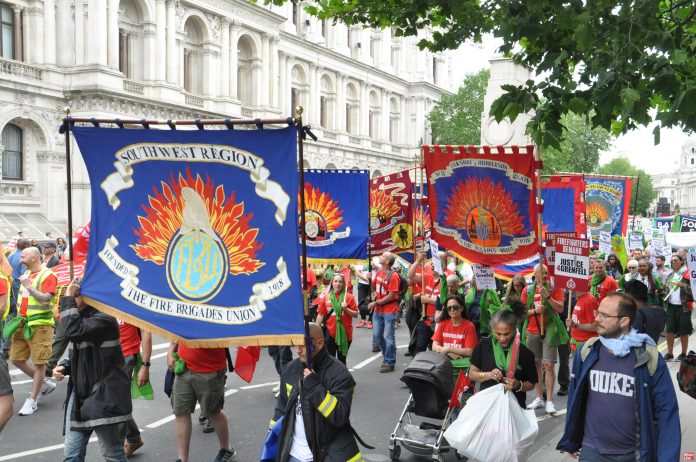‘THE cost of removing dangerous flammable cladding must not fall onto a building’s residents,’ the Fire Brigades Union (FBU) has said.
‘The government must fund residents’ removal costs until those responsible can be held accountable.’
Almost two years on from the Grenfell Tower fire, the same flammable cladding covers a total of 434 residential buildings.
Dangerous cladding has been removed from just 29% of social housing blocks and 6% of private residential blocks.
Combustible cladding has been removed from just 10 of the 176 private blocks found to be at risk, while the FBU is backing the #EndOurCladdingScandal campaign, launched by Inside Housing and UK Cladding Action Group, to address an overlooked risk to residents.
Across local authority and private housing, the government should take a risk-based approach to removing cladding and improving fire safety, rather than waiting for blame to be attributed, the FBU believes.
Andy Dark, FBU assistant general secretary, said: ‘It’s a scandal that residents who are living in tower blocks covered in flammable cladding and where basic fire safety is substandard have no certainty whatsoever that their homes will be made safe.
‘Whether publicly or privately owned the remedial work needs to be completed quickly and the government must take responsibility for getting the job done.’
Grenfell Tower’s flammable Aluminium Composite Material (ACM) cladding was one of the key factors that caused the fire to spread so rapidly, alongside the failure of ‘compartmentalisation’, where each flat is built as a fireproof unit.
The next phase of the Grenfell Tower Inquiry will focus on conditions that led to the fire, including those in business and government who did not act on warnings about unsafe building practices.
The FBU is a core participant in the ongoing inquiry and has been a strong advocate for improving tenants’ rights. The union has repeatedly criticised the government for its complacency on Grenfell, cladding, and wider fire safety issues.
Meanwhile, in the north of England, an incident last week saw firefighters left waiting beside their phones as two wildfires ravaged local forests and moorland.
Crews at the scene were stretched to the limit, while ‘complacent’ management chose not to call in firefighters waiting on-standby, according to the Fire Brigades Union (FBU).
The news comes after Cleveland fire authority’s decision to introduce a minimum of 18 fire engines on duty in Cleveland. The FBU warned at the time that cutting the engines would impede firefighters’ ability to respond to multiple largescale fires at once.
Full-time firefighters in Cleveland agree to be ‘on-standby’ on a number of occasions each year, and wait by their home phone, ready to be called to duty.
Should they receive a call, they are contractually bound to come to work.
Large forest and moorland fires broke out in Guisborough Woods and Eston Hills, after the hottest Easter bank holiday on record. Up to 30 firefighters battled difficult conditions and stood by at the scene of fires for up to 20 hours over the seven days.
Davy Howe, Cleveland FBU secretary, said: ‘The complacent attitude of the brigade is astounding. Crews were crying out for support, while management gambled and left willing and able firefighters at home.
‘Additional firefighters at the scene would undoubtedly have been safer and more effective in tackling the huge fires.
‘The clear consequence of the cut to the number of fire engines is that fewer firefighters can attend a fire. As a result, we’re pleading with the public to keep safe and be vigilant – whether out in the countryside, at home or at work.
‘After relentless cuts to the service, Cleveland firefighters are no longer equipped to respond to multiple largescale fires.’
Cleveland FBU has repeatedly warned that cutting the number of fire engines to 18 would put the public in serious danger. The union will be reaffirming this position in light of the decision not to send on-standby firefighters to the wildfires.
- Meanwhile, a rescued couple from Barrow in Lancashire have thanked their ‘life-saving’ local firefighters after they were pulled unconscious from a flat blaze in their home at Egerton Court.
Terry Graham, 42, and Amy Foster, 36, had fallen asleep in their Barrow Island flat in the early hours when their chip pan caught fire, engulfing the Egerton Court flat in flames.
Graham thanked the fire service for its ‘rapid response’, and said: ‘We could’ve been dead in there. Thank you so much to the fire team who literally saved our lives.’
The pair had returned from walking their dog around Barrow Island when they both fell asleep and left their cooking unattended.
Thankfully, fire crews from Barrow, Ulverston and Walney rescued three people and one dog from the flat, using a hose reel and two breathing apparatus to extinguish the fire.
Graham said: ‘Next thing I remember was waking up in the hospital. I found out later that a neighbour had seen the smoke coming out the window and dragged us out of there.’
Graham, Foster and their neighbour were all admitted to Furness General with smoke inhalation.
Firefighter Paul Milburn urged residents to take care when cooking. He said: ‘We recommend that chip pans are not used and people should always stay with their cooking.
‘Smoke detectors should also be checked on a weekly basis.
‘If you do not have a detector installed in your home call 0800 3584 777 for advice.’
